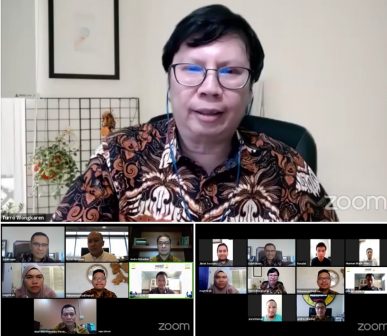Turro Wongkaren: “Weighing the Urgency of Omnibus Law during Pandemic”
Nino Eka Putra ~ FEB UI Public Relations Officer
DEPOK – (24/9/2020) The Policy Center of the Alumni Association of Universitas Indonesia (ILUNI UI) held an online discussion entitled “Weighing the Urgency of Omnibus Law during Pandemic” on Thursday (24/9/2020).
The speakers in the discussion were Turro S. Wongkaren, Ph.D., the head of the Demography Institute, FEB UI; Elen Setiadi, S.H., MSE, Special Adviser to the Coordinating Ministry for Economic Affairs representing Coordinating Minister for Economic Affairs Dr. Ir. Airlangga Hartarto, M.B.A., M.M.T.; Dr. Supratman Andi Agtas, S.H., M.H., the head of the Legislation Body of the House of Representatives; Rosan Perkasa Roeslani, the head of the Indonesian Chamber of Commerce and Industry (KADIN). It was hosted by ILUNI UI member Devan and moderated by Muhammad Fadli Hanafi of the Policy Center. The discussion was opened by Andre Rahadian, chairman of ILUNI UI, and Saleh Husin, the head of UI’s Board of Trustees.
Turro S. Wongkaren said that current situation is marked by competition among countries, the fourth industrial revolution (Industry 4.0), changes in the job market and the Covid-19 pandemic. Before the outbreak of the Covid-19 pandemic, in February 2020, the number of Indonesia’s job seekers stood at 138 million while the number of jobs available was 132 million. This means 6 million people were unemployed. The number of unemployment is expected to increase to 9 million in 2025, 5 million of them people aged 30 years old. Nearly one million of the unemployed previously studied at university and around 3.7 million are high school/vocational school graduates.

According to Turro, Law Number 13 Year 2003 concerning manpower should be reviewed because today’s condition is different from 17 years ago due to, among other things, population change, the economic crisis in 2008 and 2020, changes in the job market (nature of work has changed), and the social security (BPJS). Labor protection should be based on talent/manpower management that is related to the economy, namely enabler (regulatory landscape, market landscape, business and labor landscape), attraction (external and internal openness), growth (formal education, lifetime learning, opportunity to grow), retention (sustainability, lifestyle), vocational skills (mid-level skills, employability), global knowledge and skills (high-level skills, talent impacts).
Thus, the job creation bill could be a natural solution to anticipate the demographic bonus Indonesia will experience between 2020 and 2039, considering that the bonus could become either an opportunity or a threat.
“The job creation bill is expected to create new jobs and absorb employment. There should be a balance between the interest of the state and companies in facing this uncertainty and labor protection, regardless of the business type. In addition, the government should promote the implementing regulations issued by government ministries/agencies to the public. To promote the bill, the government should involve all related parties to sit together and discuss the bill in great details. This will minimize polemic,” said Turro. (hjtp)
The article also appeared in: https://investor.id/business/iluni-ui-minta-terobosan-omnibus-law







(lem)

